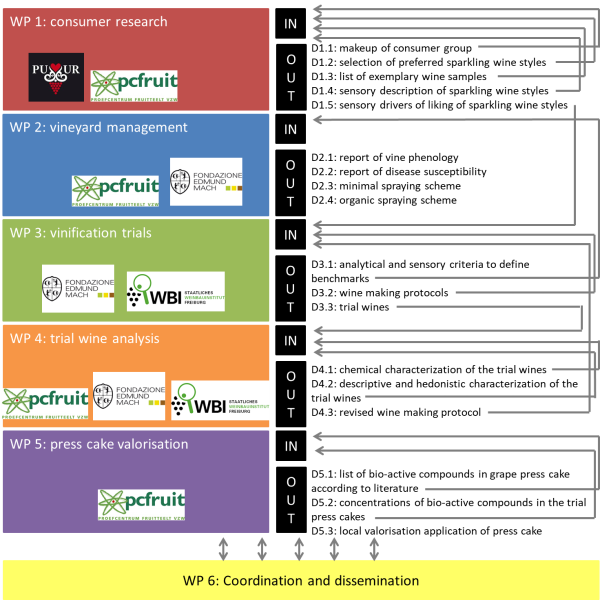Sustainable production of innovative sparkling wine
Introduction
The SPiwi-project aims to investigate and optimize strategies for the production of future oriented organic ‘SParkling’ wines, made from ‘Piwi’ (fungus-resistant) grape varieties. Hence the name ‘SPiwi’.
To optimize the sustainability and economic crop return of novel, fungus-resistant grape varieties and their potential in the production of a local sparkling wine. Fungus-resistant varieties give the opportunity to cultivate grapes for wine production in an organic and more sustainable way. With sparkling wine world consumption increasing each year, together with the growing interest for more organic and sustainable products, the use of these novel varieties in the production of this type of product can be of economic importance.
The potential of the fungus-resistant grape varieties for the organic production of grapes will be evaluated in one classical vine producing region (Northern Italy) and a more northern region (Belgium). Grapes will be send to Germany where they have a good knowledge about the potential of the fungus-resistant grape varieties in the vinification. Therefore they’ll develop a chemical-free sparkling wine vinification process. As Belgium is a relatively new winegrowing region, the consumer acceptance of the resulting product will be evaluated. Also the use of waste streams in innovative products in the local Belgium industry will be assessed.
Background
Europe has a leading role of organic wine production in the world (almost 90% of the total organic grape production worldwide is located in Europe). New insights in organic and sustainable viticulture are therefore of economic importance. The introduction of fungus-resistant varieties (piwis) can partly avoid the yield losses that often occur in organic viticulture. However, there is a lack of knowledge of these novel varieties among the consumers and wine makers which hampers further expansion of piwis and thus sustainable and resilient development of the wine industry.
To further optimise the sustainability and economic crop return of these varieties, this project will de-velop guidelines for organic crop protection, it will develop a chemical-free vilification process, it will research its waste streams and finally the consumer acceptance of these organic wines. These findings will be demonstrated and an economic feasibility study will be communicated to the public.
Main project activities
The Spiwi project aims to investigate and optimize strategies for a future oriented production of or-ganic sparkling wines in 2 classical European vine producing regions (Northern Italy and Southern Ger-many) and a more northern region (Belgium), in which the area of vinegrapes is currently small but yet increasing with approximately 15-20% per year.
Sustainability is addressed from multiple angles :
- in the field phase the emphasis is on the selection of suitable resistant cultivars and on the development of guidelines for organic crop protection
- a chemical-free vinification process is developed and will form the knowledge base for organic wine production with resistant cultivars
- a consumer sur-vey for the acceptability of those novel type of wines is executed.
- Qualification and quantification of vinification waste streams, the presence of bioactive compounds and their potential for added value products in the local industry.
Moreover, the waste streams of the vinification process are qualified and quantified and the presence of bioactive compounds herein is described. The potential for the creation of added value products based on these bioactive compounds in pharmaceutical, cosmetical and food industries is assessed by presenting the results to those industries and by exploring their needs and interests in further product development.

Expected results
Besides guidance on the selection of disease-resistant grape varieties for planting, the management practices of the organic vineyard will be demonstrated and an economical feasibility study will be communicated to farmers so that grapevine growers, oenologists and advisers can adapt their vineyard crop management and/or their vinification procedures according to the outcome of this project. Regional differences at the location of the consortium members will address local farmers' needs and give insights on the best choice in view of upcoming climatological challenges.
Keywords
Piwi, viticulture, zero-residue, organic, waste valorization, expert in agricultural science (wine)
Project consortium
Coordinated by
- Vicky Everaerts - Proefcentrum Fruitteelt vzw - Belgium
Partners:
- Staatliches Weinbauinstitut Freiburg, (DE)
- Fondazione Edmund Mach, (IT)
- From 19-on B.V.B.A., (BE)
- S.M.C.S., (BE)
More information
Project website: https://www.pcfruit.be/nl/SPiwi
Social media: https://www.linkedin.com/company/pcfruit/ & https://www.facebook.com/ProefcentrumFruitteelt
Presentations
- Kick-off project meeting - February 2021
- SPiwi - Sustainable production of innovative sparkling wine
- Mid-term project meeting - November 2022